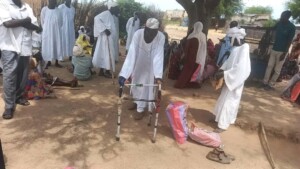Cholera: Campaign to contain callous killer
Presentations on the streets, online videos, posters, bars of soap. There is little that the dozens of local initiatives have not done to help people fight against infection and raise awareness about the rapid spread of cholera in Sudan.
Presentations on the streets, online videos, posters, bars of soap. There is little that the dozens of local initiatives have not done to help people fight against infection and raise awareness about the rapid spread of cholera in Sudan.
Without any support from the Sudanese government in Khartoum, a number of local and civil voluntary initiatives have been active in the fight against cholera. The disease has claimed 940 lives since cholera cases emerged in Blue Nile state in August last year, according to the National Epidemiological Corporation.
The campaigners are known to provide information to residents about prevention and local treatment services. Doctors joined some of the initiatives and treat affected people in their homes or transfer them to isolation wards, set-up by hospitals or health centres.
“The initiatives use all kinds of means to coordinate this work,” said campaigner Najda Mansour, a grassroots activist speaking to Radio Dabanga. “Social and chat media such as Facebook and WhatsApp, which are also used to raise health awareness among people through videos about cholera prevention and illustrations.”
The groups create leaflets and videos that explain the diagnosis of the disease, and methods to prepare perfusion solutions at home in order to increase prevention methods.

Cholera awareness campaign on the street in Omdurman (RD)
In several states the Home-to-Home programme helped to identify the extent of the cholera spread, by campaigners visiting residents at home, and identify ways to deal with it. Soon after, medicines, intravenous fluids and salts were provided to people, as well as soap, disinfectants and detergents in hospitals.
“The field teams also try their best to organise environmental sanitation programmes and repair water systems. Water pollution was the main cause of the rapid spread of cholera in the White Nile,” said Mansour.
Mosques, public transport
“The teams go to homes, mosques, public gatherings, markets, public transport, and more, to provide information about avoiding cholera and how to deal with infected people.”
“The government's failure to declare the epidemic was the main obstacle to initiatives.” – Najda Mansour, campaigner


Mansour, originally from White Nile, has contributed to the preparation of youth and intermediate cadres to work in the health education and awareness field. She is active for several initiatives, including the umbrella Save Sudan.
Also for her the exact manpower behind all local initiatives against cholera in Sudan is unable to be determined. “Initiatives started last year when the epidemic began in Blue Nile state and then extended to other states, to bridge the gap left by poor health care provided by state and federal health ministries.”
There was Save White Nile, which was established last year, and was renamed after it became clear that the disease reached epidemic proportions in the country, to Save Sudan. In addition to the nationwide National Epidemiological Corporation, there is the Sharra Alhawadith Initiative, Nafier Kosti, the Sudan Red Crescent, and the Emergency Campaign of Tiba Alahamda in Khartoum.
Despite covering different working areas, they have managed to agree on a unified vision on intervention and scientific methods, said Mansour.
Government
Campaigners also monitor the media to establish the number of infected people in isolation wards or certain neighbourhoods, and then pass the numbers through to independent media. “They can define the rates of the epidemic and criticise the government's silence on the numbers.”
The Sudanese Ministry of Health and World Health Organization (WHO) reported in June that there were almost 15,000 suspected cases of acute watery diarrhoea, including 279 deaths, from August onward. The Sudanese authorities continue to deny that cholera broke out in Sudan, and instead use the term acute watery diarrhoea.
Mansour stressed that the Sudanese should be informed that not the Sudanese government, but popular initiatives are providing the information services concerning cholera. “Humanitarian problems occur when the government fails in its duties to provide services to its citizens.”
Arrests
The government has monitored organisations that are active in the field of cholera control through arrests, claimed the head of one of the parties which have held the most awareness-raising campaigns in towns and cities.
Noureldin Salaheldin, head of the Sudanese Congress Party (SCP) branch in Khartoum, told Radio Dabanga that his party is fighting cholera on two tracks: humanitarian and political.
Concerning the government's reaction to the party's efforts in the field of health, Salaheldin accused Khartoum of monitoring cholera control campaigns through arrests.

Activists inform displaced people in Zamzam camp, North Darfur (RD)
A total of fourteen SCP members were arrested in the course of their activities to inform residents in Khartoum North, North Kordofan, and Omdurman about cholera prevention. “Posters, leaflets, and disinfectants they were handing out, were seized.”
In addition to this, there are incidents in which journalists and doctors have been detained or warned not to speak out about cholera in Sudan. In June, the Khartoum Health Ministry dismissed the director of the Omdurman Emergency Hospital for reporting “cholera cases”.
 School children
School children
As many activists, Mansour and Salaheldin primarily want to urge Khartoum to start acting in accordance with global protocols on epidemics, declare the cholera epidemic, and act accordingly. The Sudanese authorities refused to postpone the opening of the new school year in order to contain the spread of the infection among children.
“While in the school environment, we see a low health awareness of students, making them more susceptible to infection,” according to Mansour.
“A single message from official Sudanese media, accurately designed, can make a real difference in terms of reducing cholera rates.” – Mansour
With regard to the problems and obstacles facing the work of popular initiatives, Mansour said that the initiatives face obstacles directly from government agencies, preventing volunteers from working in the areas where the Nile runs.
Mansour: “The government's failure to declare the epidemic was the main obstacle to the initiatives. The government has to ease the restrictions and cooperate with the local initiatives.”
Follow #CholeraInSudan, #الكوليرا_السودان for ongoing coverage by Radio Dabanga











 and then
and then